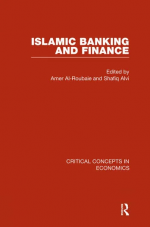Tab Article
Islamic banking refers to a financial system which is consistent with principles of Islamic law (or ‘sharia’) and guided by Islamic economics. In particular, Islamic law prohibits ‘riba’ or usury, the collection and payment of interest. Additionally, Islamic law prohibits investing in businesses considered unlawful (‘haram’) or contrary to Islamic values. In recent years, a number of Islamic banks have been created to cater to the growing demand, driven by globalization and the vast wealth of some Muslim states in the Middle East and Southeast Asia, and Islamic finance has moved from a niche position to become a mainstream component of the global banking system.
A large amount of research has been undertaken into this subject (much of which highlights the institutional aspects of Islamic social, economic, and financial arrangements) and this new four-volume collection from Routledge meets the need for a one-stop collection of the best scholarship. Its scope extends from the time of the creation of Islamic institutions in accordance with Quranic principles to the present day. And while Islamic Banking and Finance surveys the historic evolution of Islamic financial institutions over the last 1,400 years, it also illustrates the directions in which the subject is moving, including its role in the new world order, good governance, and transparency, and how the gaps can be bridged between Islamic and conventional financial systems.
With a full index, together with a comprehensive introduction newly written by the editor which places the collected material in its historical and intellectual context, Islamic Banking and Finance is an essential work of reference. It is destined to be valued by economists - as well as by scholars, students, and researchers of Islamic Studies, Middle East Studies, and Business Studies - as a vital resource.


